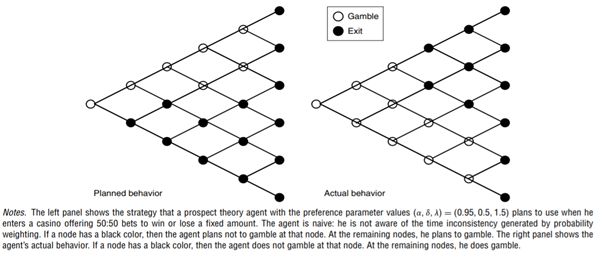Introduced by Amor Tversky and Daniel Kahneman as a descriptive model of risky decision-making, prospect theory describes an influential phenomenon called "loss aversion": the natural tendency to respond more strongly to losses than gains when people evaluate risky choices. According to the theory, individuals don't use objective probabilities in their calculations but weighted ones based on what is perceived as loss and gains. If someone faced a risky choice leading to gains, they become risk-averse, preferring the choice with higher certainty. But if someone faced a risky choice leading to losses, they become risk-seeking, preferring the choice that actively avoids losses.

A research done in 2012 by N.C. Barberis that modeled the behavior of a casino gambler based on prospect theory can give a broader picture on how it is displayed in real life gambling. In this scenario, a casino gambler enters the casino to gamble at the offer of 50:50 bets and the plan to leave when faced with losses and stay while winning. Contrary to their original plan, the gambler kept on updating their beliefs about their chances of winning and losing. They gambled as long as possible when losing and stopped once they accumulated some gain, therefore capturing the point that was made in the previous paragraph, namely, that people often gamble more than they planned to in the region of losses (Barberis, 2012).

Gambler's Motives
Though some inconsistency doesn't always mean they are irrational, some regard them as bounded rationality. A gambler displaying boundedly (ir)rational behavior still has enough self-control to keep their losses from gambling within acceptable limits by societal standard. One example showcasing bounded rationality can usually be found in slot machine gamblers. They believe that their gambling abilities are much more skillful than they actually are. This can be interpreted as a cognitive limitation as they're unaware of the functionality of the machine or the randomness of wins and losses, already programmed to exploit the heuristic decision-making pattern of the gambler by the casino running it.
However, regular gamblers of slot machines don't try to maximize their profit. Instead, they gamble with small stakes with the objective of maximizing their time spent playing, despite their awareness of losses (Griffiths, 1994). Their incentives to gamble aren't fully financially related, as they "gamble with the money rather than for it". In their case, the act of gambling itself can be interpreted as providing a kind of consumption benefit (Ibid.). When one gambles for the sake of gambling, deriving consumption utility from the activity itself, then it might be counted as rational even when they keep on losing.
Regardless of the theories involved, it is almost impossible to infer one single reason on why people gamble. There's not one definite representative who represents the gambler population as a whole. There are various degrees of rationality and different motives involved, ranging from those deemed as rational with cognitive ability to count as those with financial motives and gains, to irrational gamblers gambling their lives away despite their losses. Whether they want to do so for the promise of effortless money or the fun of gambling itself, the real winners are those who provide gamblers a dinner with 'lady luck' herself.










